
This review may contain spoilers
A Live Action Adaptation That Should Be Forgotten
Some manga/anime series should never be adapted to live action and Fullmetal Alchemist is one of them. While Japanese-speaking European characters are not uncommon in anime, this poses a big problem when done in live action. Asian actors wearing blond wigs and pretending to be Caucasians are not the least bit believable. They look like a bunch of cosplayers wearing badly styled cheap wigs. Hiromu Arakawa created a complex world where alchemy is used as if it were magic but treated as a science. She meticulously explains her concept in the manga and it was translated faithfully to its anime version. However, the film fails in this when it uses merely one scene in which Al awkwardly explains the process of alchemy to a bunch of townspeople. If you're a fan of the series, then you wouldn't have any problems getting into the story. If not, then you'd have difficulty understanding equivalent exchange, the gate of truth, and such.Even though the costumes, sets, and visual effects aren't terrible, the majority of the casting is. Ryosuke Yamada, for all his good looks, simply does not embody what Edward Elric is all about. I just couldn't see the loudmouthed midget with an attitude in him. His acting is tolerable at best. Winry has always been a bit annoying but she is an automail genius and certainly no damsel in distress. She actually plays a vital role in the brothers' lives, something the film fails to show. Also, the actress they've chosen to play her cannot act to save her life, let alone build an automail arm. Al may look exactly as he does in the anime, thanks mainly to the special effects team, but he sounds more like an effeminate male teen than a child who never really got to grow up. Dean Fujioka makes a handsome Roy Mustang, but he plays him too seriously that he ends up looking woody and awkward most of the time. The Flame Alchemist is humorless at times, yes, but he is also one of the most complex characters in the series who pretends to be a self-absorbed womanizer to hide his vulnerabilities. Perhaps with better writing, Dean could have done the character justice.
The homunculi are passable with Yasuko Matsuyuki's Lust standing out of the three that are included in the film. But it is Sato Ryuta's portrayal of Maes Hughes that is most memorable for me. Hughes is a fan favorite and I've always hated the idea of him being killed off. Ryuta made me care as much about the character as I did in the manga/anime that his death bothered me all over again. All in all, the movie is entertaining but not nearly as good as the original series. It got some things right, but it got a lot of it wrong that it just doesn't do the original manga/anime justice. Fullmetal Alchemist is one of my all-time favorite series and as a fan, I am disappointed with this live action version. Like most live action films of Japanese manga series, this one fails in most aspects.
Was this review helpful to you?

This review may contain spoilers
Kudaranai!
Ajin is a prime example of what happens when movie producers, writers, and filmmakers don't respect the original material and just create a live action adaptation of a popular manga/anime series for the cash grab. I can think of only one word for the movie, “kudaranai”, which means pointless. Although it has a great cast of actors, none of them (except one) are appropriate for the parts. With the exception of Tamayama Tetsuji as Tosaki, the rest of the cast don't look or act like the characters in the original series. Nagai Kei is supposedly a 17-year-old high school student aspiring to become a doctor and yet they chose to cast a nearly 30-year-old Sato Takeru. Instead of casting a suitable actor for the part, they changed the character into a 26-year-old med student to fit the actor they've chosen. I would have been fine with this change if they had bothered to actually give depth to the character and explained his motivations instead of just making him an unusually intelligent young man whose intentions are not quite clear.Nagai is not your garden variety ajin, his IBM and black ghost first appeared when he was just a baby so he has an excessive amount of the stuff, allowing him to call upon his black ghost multiple times unlike most ajin. He also has low emotional intelligence, making him almost emotionless, cold, and indifferent. But he's incredibly smart and observant, allowing him to think more logically and strategically. None of those things are explored in the movie. Shirota Yuu as Tanaka is just a waste. With the way they wrote the character, he could have been played by basically anyone, there was no need for them to hire a popular actor. Shimomura is reduced to a mere sidekick, not one bit of character background is given. But my biggest disappointment is Sato. Ayano Go may be one of the most popular actors in Japan these days but his acting talents simply cannot make anyone believe he's actually an elderly man. Sato is not even Japanese! His real name is Samuel T. O'Brien (Owen in the manga), Sato is just the name he used when he came to Japan. He was born in the 50's and he's a war veteran with exceptional combat skills. He also appears to be a friendly and kind old man, that's why Nagai initially trusted him. He may be brutal and calculating but on the surface, he seems calm and respectable. By changing the age of the character, they completely scrapped this aspect of his persona. Ayano's portrayal comes off as psychopathic and warlike, the complexities of the character lost in his John Wick-like gun-fu. It's probably one of the worst casting choices I've ever seen.
Tamayama Tetsuji's portrayal of Tosaki is the only thing that remotely reminds me of the source material. But even his character has no real depth, his motivations are also unclear. The rest of the characters are as pointless as this movie, just mere fodder. The special effects are decent but could have been better. Why Japanese film producers continue to hire the same old popular actors instead of holding auditions and finding the perfect actors for the roles, escapes me. I am now utterly convinced that the anime stage play productions are so much better at adapting anime/manga series for they really try to remain faithful to the source material and cast the most appropriate actors they can find.
Was this review helpful to you?

This review may contain spoilers
Manji The Killer of 100 In The Flesh!
Takashi Miike's 100th film is based on a seinen manga by Hiroaki Samura about an immortal samurai who must kill 1000 evil men to gain redemption. I suppose it's understandable that those who are unfamiliar with the manga might compare it with Logan. There are certainly some similarities with Manji having lived long enough to become weary of killing and finding a new purpose to go on. Not to mention, his ability to heal wounds is very Wolverine-like. But the similarities end there. This is a story of revenge much like Quentin Tarantino's Kill Bill, but it's also about a man struggling to find a semblance of redemption before he finally succumbs to death. It's not as good as the manga, unfortunately, but it does well in bringing the characters to life and Miike is not shy about showing the brutalities the manga is known for. The movie lacks proper character development for the minor characters, including its main villain, but it's understandable considering this was based on a manga series consisting of hundreds of chapters that spanned years in the making. You can only do so much with a little over two hours of run time. I never would have imagined Takuya Kimura for the role but I had totally forgotten that I was seeing a former boy band member and thought only of Manji the Killer of 100. He was almost unrecognizable in the role. The fight scenes are well-choreographed and executed. There are no over-the-top wuxia-like flying or frantic sword fighting that made the Rurouni Kenshin movies so popular. But it does boast of nearly realistic sword play that you find in samurai films of old combined with Kill Bill-type of bloody fights, which make the film better in my opinion. Sorry Kenshin but Manji is the shit! Just try killing this dude, you can cut off his limbs, even his head and he can still re-attach them! Fans of Japanese cinema might find more than one familiar face in cameos and small roles. I just wish this was turned into a series instead of a movie so the characters can be fully fleshed out and Manji's immortality could be properly addressed. But on the bright side, there's room for a sequel or sequels. As samurai films go, I'd give this a 7.5. Highly enjoyable, great lead character and well-crafted fight sequences that make you cringe with all the blood and gore. It's certainly a win for Takashi Miike.Was this review helpful to you?
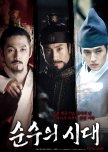
This review may contain spoilers
I watched. It was awful. A story about sex and violence. Soft porn. Soft on the principle that they don't show everything, because there is nothing soft in the behavior of the characters. Disgusting. I feel sorry for the good actors who had nothing to play, they just had to f***To tell the truth, I approached this film because of the actor, whose talent I like and respect, but after what I saw here.... Well, maybe the script wasn't so bad, maybe it was the director who was at fault, because it just so happens that after a negative review of his drama, I checked what he had made and remembered this film, which I had managed to forget before. In any case, I don't recommend it, unless you like mindless sex and violence without a clear plot.
Was this review helpful to you?

This review may contain spoilers
Structurally doomed
I could feel it.Right about midway the writer was getting boxed into a tragic ending, then, was forced to make it a good ending. Solution; Tack on an alternative timeline!
Ruined what could have been something truly special. If they wanted to go that way, they should have done so from the beginning.
Odd scenes like; The car breaks down. Next scene they're back to hotel. Next day they're back out in the now working car, which promptly breaks down again? 😂 Huh? This goes beyond a mistake, suggesting general stupidity. If this was an alternative timeline, it was a really stupid one.
Just organize the scene intentions properly; Where are the characters at emotionally? What is believable and will drive the story forward? Get rid of everything else. Of course this only works if you HAVE a story.
And, I don't care if it's "BL". I care if time is taken to get the story right for the cast and crew who put so much effort into it. As it is, the barely first draft mode story failed a great cast, soundtrack and cinema photography trying to dress it up.
In an alternative timeline, I wrote a glowing review, while admitting I understood almost nothing.
Was this review helpful to you?
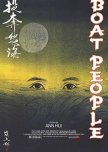
"Run towards the angry sea"
Boat People aka Run Towards the Angry Sea dealt with the brutal years directly following the end of the US/Vietnam War when Ho Chi Min and his party reunified Vietnam. This was the third film Ann Hui directed focusing on Vietnam resulting from stories she had heard while making the previous two. This film told the story of a Japanese reporter and the impoverished children he befriended.Akutagawa Shiomi had reported favorably on Ho Chi Min’s government previously so he was invited three years later to see the country’s progress. His visit to a New Economic Zone is highlighted by happy children singing and greeting him. Not long afterwards he sees people being forcefully removed from their homes. Troops beat first and ask questions later when he photographs horrific scenes. He follows a girl who scooped up noodles from the street and meets her family who are fearful of him. The oldest son tells him he can photograph them on the street for a price. As Akutagawa explores the city and NEZs without his escorts he comes to find that his initial introduction had been a show and that numerous people were willing to risk anything to flee their fates.
I’m old enough to remember the humanitarian crisis of the Boat People when nearly 300,000 people died at sea. This film did not focus on the boat people but rather the circumstances that drove people to make such a dire decision. The New Economic Zones were home to “bad elements” which could simply mean having been a capitalist or having contact with western countries or having wrong ideas by virtue of living in the south. Clearing land mines or farming in remote, inhospitable conditions was not a future many people had envisioned.
George Lam played reporter Akutagawa. He gave a strong performance as a left leaning reporter whose eyes were gradually opened to the horrors around him. A young Andy Lau played a former translator sentenced to a NEZ who was determined to leave the country before being blown up by a land mine. Newcomer Season Ma was believable as Cam Nuong who did what she needed to do to help her family and also had dreams of her own.
The biggest drawback for me was the lack of a language barrier. For the most part, everyone spoke Cantonese. And while there was a segment of the society that was ethnic Chinese, the Hao, who suffered greatly under the new regime, that didn’t seem to be the case here. Lam and his buddy Inoue’s Japanese didn’t sound very authentic, but I’m hardly an expert. I also had a hard time watching Akutagawa use his camera in the pouring rain. Not sure his camera would have survived the punishment he put it through.
While Ann Hui attempted to be apolitical, this time in Vietnam’s history could easily have been a criticism of any totalitarian regime that shut down free thinking and punished those who were seen as suspicious or disloyal. The terrible conditions left from decades at war were also visible. Land mines and unexploded ordinances took their toll as much as the unsympathetic party in control. The film was not an indictment on Vietnam in our present but on a specific time in its turbulent history and the price some people paid for not being on the winning side.
Boat People won numerous Hong Kong Film Awards including Best Picture and Best Director. The transformation of Akutagawa as he went from the idealized version of events to the harsh reality was poignant. The asexual friendship that developed between him and Cam Nuong which went from caution and suspicion to acceptance and compassion also hit the right notes. Without any spoilers, Boat People was tragic and heartbreaking on many levels yet also showed the determination and resiliency of the human spirit.
28 November 2024
Triggers: Deaths from many different graphic sources. Sexual content was alluded to but not shown.
Was this review helpful to you?
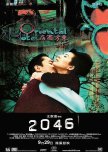
This review may contain spoilers
it just clicks with me
I think that this is Wong Kar-wai's cinematic masterpiece. It is a dreamlike exploration of love, loss, and the human condition. It's a film that lingers in the mind, a haunting melody that plays on repeat. I remember the first time I watched it, I was mesmerized by its beauty and complexity."The past is never over. It's just a story we tell ourselves."
The film is a tapestry of interconnected stories, each one a poignant reflection on the complexities of human relationships. Tony Leung's portrayal of Chow Mo-wan is nothing short of iconic. His nuanced performance captures the character's loneliness and yearning with a haunting intensity.
"Love is all a matter of timing. It's no good meeting the right person too soon or too late."
Zhang Ziyi's performance as Bai Ling is equally captivating. Her character is a mysterious and alluring figure, a woman who seems to embody the very essence of desire. Her chemistry with Tony Leung is palpable, and their scenes together are electric.
"Time is a thief, stealing the present from the future."
The film's nonlinear narrative structure adds to its dreamlike quality. It's like a puzzle, with pieces scattered across time and space. As the viewer, we're invited to piece together the fragments of the story, to connect the dots and discover the underlying meaning.
"Love is all a matter of timing. It's no good meeting the right person too soon or too late."
At its heart, 2046 is a film about the human condition. It explores themes of love, loss, memory, and the passage of time. The characters are constantly searching for love and connection, but they are often doomed to disappointment. The past haunts them, and they struggle to let go of their regrets.
"In love you can't bring on a substitute. When the Peony blooms, she stands tall. Does she mean no or yes?"
Wong Kar-wai's signature visual style is on full display in 2046. The vibrant colors, the stunning cinematography, and the evocative music create a truly immersive cinematic experience. The film's soundtrack, composed by Shigeru Umebayashi, is the perfect complement to the film's melancholic tone. It's a haunting melody that lingers in the mind long after the movie ends.
"Maybe one day you'll escape your past. If you dream hard enough."
2046 is a film that demands patience and attention. It's not a straightforward narrative, but a series of interconnected stories that unfold slowly and deliberately. But if you're willing to let yourself get lost in its dreamlike world, you'll be rewarded with a truly unforgettable cinematic experience.
"I once fell in love with someone. I couldn't stop wondering if she loved me or not. I went to 2046 hoping to find her there. But I never found her."
Was this review helpful to you?
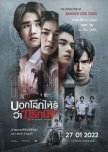
This review may contain spoilers
It is different
*Is it worth watching?*The short answer is yes . Once you get past the appreciated but terrible subtitles you will love the movie . You will see Perth and Bas in a whole new light .
*The Plot*
The plot is not bad but it needed a bit more work . majority of the movie will be spent analyzing what is going on and in the last minutes everything is made clear . This would have been better as a mini series.
*Bl or Bromance*
Watch Bl series has thought me that there is a thin line between how Bl series are different from bromance. I strongly believe that the relationship between Boang/Kheng and Kheng/Tai could very will be bromance but there are intricate details that would support the two pairs having some romantic feelings for each other . This is no explicitly stated rather it is implied. It can very well be bromance or a Bl . However, since I’m me 🙈I am going to go with Bl.Also based on the character portrayal Kheng would evidently be gay .
*Where to watch*
https://www.dailymotion.com
https://boyslovefactory.com
Full disclaimer the subtitles suck big time . No offense to the sweetheart ❤️that did the subtitles. My guess is that if the movie is watched with more accurate subtitles it would be better understood. bye 👋
Was this review helpful to you?

This movie does not deserve 9 stars but I loved it
Okay I am going to be honest, this movie was cringe, it was imperfect, it does not deserve 9 stars. But I really, really loved it and it made me smile so much and I had to fight the urge to rewatch it immediately after finishing it! I can't rate it lower!It was so cute. I loved her expressions and how cute she was and the same with him! Despite all the cringe, I found them to be so cute together and I really loved the movie despite knowing how flawed it was. I can't really tell you why I loved this movie so much, but I really, really did. It may not be everyone's cup of tea, but it certainly was mine!
Was this review helpful to you?
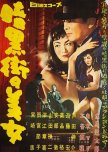
This review may contain spoilers
Diamonds Are a Man's Best Friend...!?
At the time of the release of his ‘Underworld Beauty’ in 1958, Seijun Suzuki had already been, to all intents and purposes, a director employed by Nikkatsu for a couple of seasons (his debut dates back to 1956); this role, which we could define as a ‘ alimentary’ one, saw him engaged (or rather, obliged!?) in the production of at least three/four films a year (it seems to be a sort of Rainer Werner Fassbinder ante litteram...), given the enormous demand for movies of the period.In order to satisfy the tastes of the new film-addicted generation, Nikkatsu had embarked on a rich production of action/noir/gangster-style movies, inspired by American cinema, where often the stylistic/narrative themes of US-made genre films were adapted to the typical Japanese style and situations, so as to achieve a strong impact on the local audience (who got the message) with minimal expenses.
These were in fact low-budget works, perhaps of little artistic importance but perfectly functional at the box office and capable of bringing out a decidedly interesting generation of actors; To already established leading names such as Ishihara Yujiro and Akira Kobayashi, were soon to be added other performers such as the very ill-fated Keiichiro Akagi (who died at only 21 years of age, a sort of Japanese James Dean), Wada Koji and above all, Shishido Jo, who thanks to his connection with Suzuki himself succeeded in increasing his fame even outside the national borders.
In the midst of such a considerable amount of productions (in 1958 alone, Motion Picture Association of Japan, Inc. refers to 504 domestic productions and 169 imported films!), it was rather complex even for film critics to follow all the productions in circulation, all the more so as these genre films were often hastily classified as ‘B’ productions; but it was clear that in the midst of perhaps repetitive or easily forgettable films, it was plausible to find the classic ‘hidden gem’.
It is therefore interesting to observe how, in the context of a narrative structure that is still rather linear, at least at the outset, decidedly indebted to gangster movies made in the U.S.A. (Suzuki, by his own admission, has always been a lover of ‘Hard Boiled’ novels), ‘Underworld Beauty’ is characterised as a product of a high level, capable of also providing ‘in nuce’ several characteristic elements of our master's inimitable style:
Released from jail after three years following a robbery, the gangster Miyamoto recoups the diamonds from the crime, conveniently hidden, with the aim of reselling them to help his comrade Mihara, who was badly injured on that occasion, and his sister Akiko, a young woman with no prospects; his boss Oyane arranges an exchange with buyers, but the deal is scuppered when mysterious masked armed bandits appear; Mihara, in an extreme gesture of desperation, swallows the diamonds, but then falls from the roof of the building, dying of his injuries. From that moment on, a war breaks out between Miyamoto and his former accomplices to recover the precious stones, with the ex-con also working to protect the young and restless Akiko...
The starting premise is decidedly interesting and from the very beginning, the style appears clear, immediate, without frills or wasted time; Miyamoto -played by the mature and impassive Michitaro Mizushima- is a sort of lone wolf (exemplary synthesis of Chris D. in his fundamental ‘Outlaw Masters Of Japanese Film’) who, after having paid his debt to justice, feels obliged to ‘compensate’ his friend Mihara, who has suffered the highest price for the heist; from the very first lines, the ex-con appears to us as a sort of ‘modern Ronin’, alone against everyone, with few words and a lot of concreteness, an attitude that immediately leads him to set himself against his ex-criminal companions (and obviously the boss) who just don't want to give up the precious booty.
Curiously enough, in this ‘Underworld’ of criminals (real or could-be) where greed and lust for wealth, mixed with explicit primordial pulsions, seem to be the only values sought after, it is Miyamoto who comes out best of all, guided by an unshakeable ethic, nourished also by a double sense of guilt (first the incident and then the death of his friend) that leads him to risk himself in order to save Akiko (Mari Shiraki, perfect and always abundantly undressed), who, for her part, does not really represent the model of the ideal woman, but rather, with her youthful arrogance, sexual frenzy and unregulated life (she bullies and takes advantage of schoolgirls), she seems like a character straight out of the novels (and movies) of the Taiyozoku universe (‘Sun Tribe’), coming to characterise a sort of prototype of the more classic ‘Dark Lady’
If for Eric Von Stroheim money is always at the origin of all evil, here it is diamonds (3, in number... ) that unleash the most belligerent instincts of the characters who, in order not to renounce their earnings, are ready to do anything to recover the precious stones, triggering a series of situations that allow the skilful Suzuki to show his already characteristic technical skill, as well as his ability to synthesise (editing cuts, close-ups, sudden changes of camera angle), mixed with a good dose of his classic black humour that will distinguish him throughout his career; Emblematic from this point of view is the entire sequence with the mannequins as key figures, of great effectiveness and even amused mockery.
As far as the purely stylistic aspect is concerned, Suzuki works for the first time in widescreen, using a remarkable B/W that tends to emphasise the grey scales, with a result that is, to say the least, ‘brilliant’ (it is really appropriate to say so...) that amplifies, especially in the night sets (the majority), in an excellent play of light and shadows with an expressionistic cut, the ‘hard boiled’ dimension of the story; All this with a skilful and unconventional use of locations, including nightclubs, bars, rock ‘n’ roll, artists' studios and morgue rooms, as well as the boss's Turkish bath where the “incandescent” finale is set (in every sense of the word...), filmed with the master's decidedly distinctive trait, with clearly unconventional doses of sadism, explosions of violence and masterful shots even using a crane...
In his mature interviews, Suzuki will even refer to ‘Youth Of The Beast’ (1963) as the first film that can be considered entirely of his own from the point of view of narrative and directorial originality, but it is clear that already from this ‘Underworld Beauty’ (but in some points even from ‘8 Hours of Terror’ [1957]) the director began to set up that operation of ‘inner demolition’ of the genre which was to become his distinctive trademark, but which was to lead him, in 1967, to be sacked from the same film company for irremediable ‘artistic differences’ following his most famous picture, ‘Branded To Kill’.
9/10
Was this review helpful to you?

Yoru ga Aketara, Ichiban ni Kimi ni Ai ni Iku
0 people found this review helpful
simple yet charming
i didn’t expect much as i started watching mostly because of Ruki, but the movie turned out to be very good. slow pacing with interesting characters i emphasized with easily. loved the main character and obviously loved the “love interest” played by Ruki.the soundtrack and the cinematography in this one were absolutely amazing! i had a pleasure watching the movie aesthetic-wise. the plot isn’t that much unique but it’s entertaining to watch so i had i good time. will definitely rewatch this one again!
(kinda hoped for the characters to end up together but we got what we got. y’all know how japanese movies are, haha)
Was this review helpful to you?

"Stay broken, that's normal for you"
A Man of Reason had a strong cast that was dragged down by a generic story filled with coincidences and tropes. Jung Woo Sung and Kim Nam Gil endeavored to breathe life into the bland script with mixed results.Soo Hyuk is finally out of prison after 10 years. He has no desire to return to his criminal life, especially after he discovers he has a daughter. Chairman Park Eung Kook isn’t ready to let go of one of his best men and sends his minion Kang to observe him. Kang takes matters into his own hands and hires “The Washer” to take Soo Hyuk out. Things don’t go as planned when Soo Hyuk’s daughter is kidnapped.
The biggest problem with this film was that director and writer Jung Woo Sung employed tropes that were stale by the year 2000. Execution is all important when treading over old ground. It felt like he attempted to integrate elements from The Joker by having a psychotic killer and his even crazier moll stir things up. The overuse of explosives and an amusement park hideout were a little too on the nose. In the end, none of the characters were developed enough to care about.
Jung and his deep voice made for a believable reformed criminal if not a particularly menacing one. Kim Nam Gil brought the crazy as the sinister “Washer.” He also provided much needed comic relief. Disappointingly, Park Sung Woong and his long-haired wig only dropped by for a small supporting role. The Big Bad ended up being a whiny, incompetent, and jealous assistant. Kim Joon Han didn’t have the screen presence to pull off this poorly drawn character.
A Man of Reason had well-choreographed fights and car chases even when they veered into incredulity. Fans of Jung Woo Sung and Kim Nam Gil may enjoy watching these two spar and banter. Unfortunately, that’s about all Jung’s directorial effort offered.
27 November 2024
Was this review helpful to you?

An ethereal tapestry
Upon this ancestral stage, even the most virtuous are drawn in by the temptations of Maggie Cheung and Joey Wong. A rich ethereal tapestry of stunning colour, kitsch illusionism and slow-motion eroticism, Green Snake has been on my radar for a while now but little prepared me for how vividly imaginative it would end up being. A profound metaphor for the frailties of humanity and the fallacy of religion, Tsui Hark's take on the White Snake folk tale left him plenty of time to ruminate on what would happen post-1997. The snakes are depicted as creatures simply seeking to live their lives in the human world, but they face denial and persecution from strict societal norms and overzealous individuals enforcing the so-called "natural order." The primary enforcer of these rules is devoted monk, Fa-Hoi, who is also shown to be just as susceptible to desire, anger, and even hypocrisy as the snakes. While the snakes seek love, family, and hope, Fa-Hoi and his Buddhist enforcers are denying the very humanity that they claim to be upholding. Fate, love, sex, hate, religion and desire all play a role in eventually bringing down the world the two snakes attempt to build. The allegory here is obvious, Fa-Hoi’s large red surplice only means one thing: China. Beyond the film's fangs with its messaging, it's directed with all of Tsui's usual flair for the kaleidoscopic that's part art-house wuxia, part softcore smut but all beauty. Bringing weight to the proceedings are fantastic performances from its central trio with Maggie Cheung and Joey Wong turning in gorgeous performances as the sister snakes, while Vincent Zhao gets an equal opportunity to shine when the two ladies aren't bathing in the limelight. The art direction, outstanding musical score and beautiful costume design all add to the spectacle, really I only have slight niggles with the hilariously charming rubber snakes and horrendous early CGI which are thankfully kept to a minimum, other than that, Green Snake is a must-watch.Was this review helpful to you?

The scenes in Korea saved it for me
The good:when they were in Korea (meant more to me because I just returned from my first visit there).
The not good:
-The acting. With some of the actors, you could actually almost hear what was going on in their minds, "Now I walk to the door, stop, turn." Wooden or over the top acting by all.
-The makeup for the FL. The pink, pink cheeks and the pink lipstick. Learn to blend the makeup, people!
-The storyline. I've seen this story 100 times done better.
-Costuming. The women all dressed so skimpily and sleazily. Are shorts, midriffs and high heels a thing in the workplace? Not a good look for anyone.
-No chemistry between leads, partially because I felt like I was watching them "act".
My rating is only what it is because of the Korea shots, otherwise it would have been even lower.
Was this review helpful to you?

EPIC
Really enjoyed it but I don't think I would have if it wasn't for the first movie.I didn't care much for Kyoukai's life story. As ridiculous as it was ( I mean literally Shin is running around everywhere fighting here and there with barely any sleep nor food for days and the guy is still as pumped up as when he started his journey) and as obnoxiously LOUD Shin was (typical of MANY Male manga characters), it was EPIC.
The battles were impressive but my brain couldn't switch off the fact that all these generals are literally sending people to the slaughterhouse in order to get brownie points from the King. It's all in the name of uniting Qin, but the truth is, they all want the glory, the fame, the personal army, castle and money that comes with it.
I usually flee from war stories because they're just pretty sad overall, for me it's just mindless killing for this or that King. People at the bottom honestly don't care about who rules but they sure pay the price whenever a new lord wants his own little kingdom...
This is being said, it is refreshing to see a show that focus on the big lines in history book. Forget the deaths count, just enjoy the ride through the lens of those at the top and a nutcase who has a big dream. I wish I had seen this in a movie theater though. The scale of the battle and the insane castles are worth the investment. A small screen just doesn't give it justice.
Anyway. Count me in for Movie Number 3.
A solid 9.
Was this review helpful to you?
Recent Discussions
-
 Which New BL Should I Try?6 minutes ago
Which New BL Should I Try?6 minutes ago -
Constant drinking in K-Dramas18 minutes ago
-
 Soundtrack Lovers Club19 minutes ago
Soundtrack Lovers Club19 minutes ago -
 BL Drama Lovers Club38 minutes ago
BL Drama Lovers Club38 minutes ago -
 a study in colours1 hour ago
a study in colours1 hour ago


